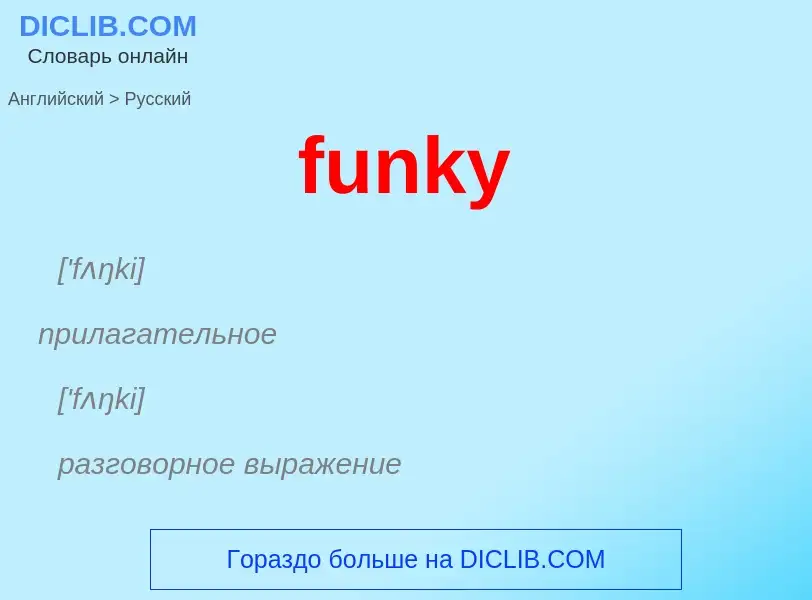Traduction et analyse de mots par intelligence artificielle ChatGPT
Sur cette page, vous pouvez obtenir une analyse détaillée d'un mot ou d'une phrase, réalisée à l'aide de la meilleure technologie d'intelligence artificielle à ce jour:
- comment le mot est utilisé
- fréquence d'utilisation
- il est utilisé plus souvent dans le discours oral ou écrit
- options de traduction de mots
- exemples d'utilisation (plusieurs phrases avec traduction)
- étymologie
funky - traduction vers russe
['fʌŋki]
прилагательное
['fʌŋki]
разговорное выражение
напуганный
в панике
трусливый
сленг
вонючий
похотливый
подчёркнуто сексуальный
отличный
старомодный
традиционный
музыка
в стиле «фанк» (род блюза)
собирательное выражение
трусливый, напуганный
[fʌŋk]
существительное
[fʌŋk]
общая лексика
хандра
уныние
испуг, страх
разговорное выражение
испуг
страх
редкое выражение
трус
музыка
фанк
джаз в стиле «фанк» (напоминающий негритянские духовные песнопения)
глагол
[fʌŋk]
общая лексика
трусить
уклоняться (от чего-л.)
избегать
увиливать
трусить, бояться
уклоняться от чего-л.
разговорное выражение
бояться
быть напуганным
курить
пускать дым
окуривать (кого-л.) дымом
вонять
смердеть
американизм
с удовольствием танцевать под приятную музыку
Définition
Wikipédia

Funk is a music genre that originated in Black American communities in the mid-1960s when musicians created a rhythmic, danceable new form of music through a mixture of various music genres that were popular among African Americans in the mid-20th century. It de-emphasizes melody and chord progressions and focuses on a strong rhythmic groove of a bassline played by an electric bassist and a drum part played by a percussionist, often at slower tempos than other popular music. Funk typically consists of a complex percussive groove with rhythm instruments playing interlocking grooves that create a "hypnotic" and "danceable" feel. Funk uses the same richly colored extended chords found in bebop jazz, such as minor chords with added sevenths and elevenths, or dominant seventh chords with altered ninths and thirteenths.
Funk originated in the mid-1960s, with James Brown's development of a signature groove that emphasized the downbeat—with a heavy emphasis on the first beat of every measure ("The One"), and the application of swung 16th notes and syncopation on all basslines, drum patterns, and guitar riffs—and rock and psychedelia-influenced musicians Sly and the Family Stone and Jimi Hendrix, fostering improvisation in funk. Other musical groups, including Kool and the Gang, Parliament-Funkadelic, Ohio Players, Fatback Band, Jimmy Castor Bunch, Earth, Wind & Fire, B.T. Express, Hamilton Bohannon, One Way, Lakeside, Dazz Band, The Gap Band, Slave, Aurra, Roger Troutman & Zapp, Con Funk Shun, Cameo, Bar-Kays and Chic began to adopt and develop Brown's innovations during the 1970s and the 1980s.
Funk derivatives include avant-funk, an avant-garde strain of funk; boogie, a hybrid of electronic music and funk; funk metal, a mix of funk and metal; G-funk, a mix of gangsta rap and funk; Timba, a form of funky Cuban dance music; and funk jam. It is also the main influence of Washington go-go, a funk sub-genre. Funk samples and breakbeats have been used extensively in hip hop and electronic dance music.



![[[Chaka Khan]] (born 1953) has been called the "Queen of Funk". [[Chaka Khan]] (born 1953) has been called the "Queen of Funk".](https://commons.wikimedia.org/wiki/Special:FilePath/Chaka Khan.jpg?width=200)
![Charlie Wilson]] Charlie Wilson]]](https://commons.wikimedia.org/wiki/Special:FilePath/Charlie Wilson-photo-by-raymond-boyd.jpg?width=200)
![The drum groove from "[[Cissy Strut]]" The drum groove from "[[Cissy Strut]]"](https://commons.wikimedia.org/wiki/Special:FilePath/Cissy Strut drum groove.jpg?width=200)

![Funk [[horn section]]s typically include saxophones and trumpets. Larger horn sections often add a second instrument for one of the saxes or trumpets, and a trombone or bari sax may also be used. Pictured is the Earth, Wind and Fire horn section. Funk [[horn section]]s typically include saxophones and trumpets. Larger horn sections often add a second instrument for one of the saxes or trumpets, and a trombone or bari sax may also be used. Pictured is the Earth, Wind and Fire horn section.](https://commons.wikimedia.org/wiki/Special:FilePath/Earth Wind and Fire.jpg?width=200)
![George Clinton]] and [[Parliament Funkadelic]] in 2006 George Clinton]] and [[Parliament Funkadelic]] in 2006](https://commons.wikimedia.org/wiki/Special:FilePath/George Clinton 2006.jpg?width=200)
![[[Isaac Hayes]] playing keyboards in 1973 [[Isaac Hayes]] playing keyboards in 1973](https://commons.wikimedia.org/wiki/Special:FilePath/Isaac hayes 1973.jpg?width=200)

![[[Janelle Monáe]] (born 1985) is part of a new wave of female funk artists. [[Janelle Monáe]] (born 1985) is part of a new wave of female funk artists.](https://commons.wikimedia.org/wiki/Special:FilePath/Janellemonae (300dpi).jpg?width=200)
![[[Me'shell Ndegeocello]] playing electric bass [[Me'shell Ndegeocello]] playing electric bass](https://commons.wikimedia.org/wiki/Special:FilePath/MeShell NdegeòCello (222747).jpg?width=200)
![The [[rhythm section]] of a funk band—the electric bass, drums, electric guitar and keyboards--is the heartbeat of the funk sound. Pictured here is [[the Meters]]. The [[rhythm section]] of a funk band—the electric bass, drums, electric guitar and keyboards--is the heartbeat of the funk sound. Pictured here is [[the Meters]].](https://commons.wikimedia.org/wiki/Special:FilePath/Meters Wikepedia.jpg?width=200)
![Chic]]. Chic]].](https://commons.wikimedia.org/wiki/Special:FilePath/NileRodgers2012.png?width=200)
![Prince]] was an influential multi-instrumentalist, bandleader, singer and songwriter. Prince]] was an influential multi-instrumentalist, bandleader, singer and songwriter.](https://commons.wikimedia.org/wiki/Special:FilePath/Prince by jimieye.jpg?width=200)
![[[The Original Family Stone]] live, 2006. Jerry Martini, Rose Stone, and Cynthia Robinson [[The Original Family Stone]] live, 2006. Jerry Martini, Rose Stone, and Cynthia Robinson](https://commons.wikimedia.org/wiki/Special:FilePath/Stone3.jpg?width=200)
![[[Talking Heads]] combined funk with elements of [[art rock]]. [[Talking Heads]] combined funk with elements of [[art rock]].](https://commons.wikimedia.org/wiki/Special:FilePath/Talking Heads band1.jpg?width=200)

